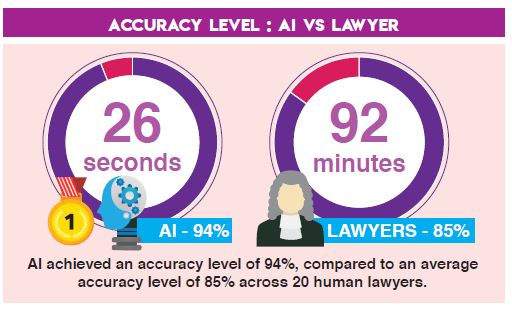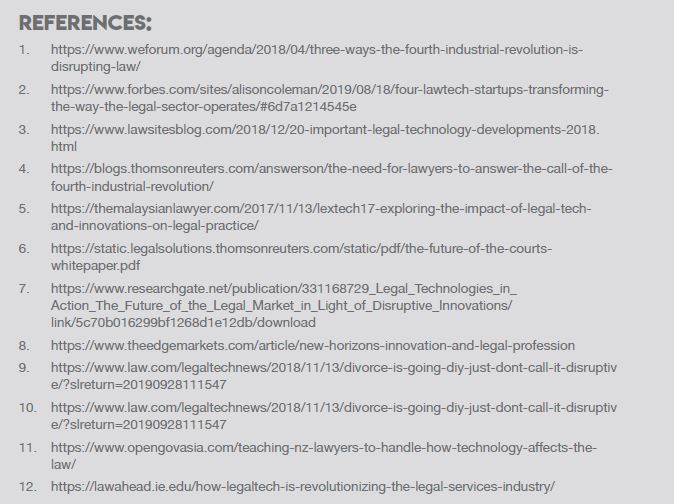by | Nadia Sullivan, nadiasullivan@might.org.my
Today, most industries are changing the way they operate. Considering how far the technology landscape has evolved, this is a given. However, the trend belies the economic reality hitting most industries. While some changes are welcomed, others have been imposed, on the basis of adapting to a fast-changing surrounding. To survive, industries need to operate fluidly and blend with constantly changing standards and requirements. Industry analysts point to a few reasons for this, but especially a lack of innovation in some industries leaves them highly vulnerable to disruption. Having said that, the legal industry is no exception. It is now subjected to being disrupted by the technological revolution. Technologies such as automation, big data, and AI are remaking how its practitioners go about their practice. Such is the impact that legal professionals are left with no choice but to adapt, sooner or later. Being connected is the hype that’s accelerating the digital world, bridging gaps between law and other industries that are a few steps ahead. But who can complain when technology is making legal processes faster and more efficient by reducing operating costs and making legal services more accessible.
Moving away from traditional perspectives
The traditional model, which has served law firms well for decades, is now in a conundrum. Following the arrival of new technologies, legal clients are demanding more. The practice’s business model has had to change too. It needs to carry over some of today’s more familiar trends promoted by technology: consumer-centric, transparent, affordable, predictable and easily accessible as legal clients are getting smarter.
Today, fresh legal start-ups are active at the frontier of new technologies. To make it more interesting, they are attracting the most talented young lawyers simply because they can offer something that most large firms can’t—flexibility. This is a trend that’s gathering pace throughout the industry. Meanwhile, young and talented freshly minted law graduates are more interested in pursuing entrepreneurial paths and job opportunities in the legal start-up community for the perks that these revitalised start-ups can offer.
However, what is even more interesting is the development taking hold in the area of legal research. Led by technology, legal research is getting smarter and more comprehensive. Now, legal research is powered by AI and natural language processing. For typical lawyers, it would normally take them weeks to complete a research. AI, on the other hand, has the ability to do the equivalent in just a few hours. Plus, AI does not get tired, sleep, eat or drink. In fact, AI can produce significantly better results than most average lawyers.
Legal Technology – the future of legal services
Legal technology, also known as legal tech, is an application of technology and software that helps law firms manage legal cases. From management, documentation to billing processes, the technology uses big data to provide e-discoveries and predictive analytics. In part, this helps both, lawyers and clients access their case, therefore reducing time, money and other laborious costs.
The legal tech industry is making progress in most developed countries such as the US, UK and Australia. Lawyers in these countries are aware of the market changes and are willing to invest in technology and adopt new innovations. This has contributed to the emergence of legal tech start-ups that use AI to automate mundane and routine legal work.
Imagine just how fast it will take to review five or more non-disclosable agreements (NDAs) using special algorithms compared to the lengthy hours it normally takes by practicing lawyers. According to a US based legal tech start-up, innovation in legal services is 200 times faster with an accuracy of 94%. This can help lawyers conduct research more effectively by enabling them to extract relevant past cases from the available data pool. Compared to the manual form of retrieving documents which is time consuming and far less accurate, a study reveals that the average time required for practicing lawyers is 92 minutes, while AI does it in 26 seconds. Further, AI can continue this process for a sustained period without rest. Of course, there are things AI can’t do—like meeting clients or showing up in court. However, AI’s potential in delivering productivity

Young lawyers today are likely the ones benefiting from this. They are more tech-savvy when it comes to handling software. It is also likely for legal firms in the future to have their own law-tech experts in house or at least, firms will insist on hiring legal practitioners with some degree of tech competency.
In Malaysia, the legal tech industry is still in its infancy. The adoption rate of technology is somewhat slower, as compared to our neighbours. However, currently, there is a growing number of firms exploring tech-driven solutions to improve their day-to-day tasks.
To speed up the development, there is a need for collaboration between law firms and local universities. Universities need to ensure that they can produce future graduates with the right skills to exploit legal technologies and platforms gaining ground in the sector.
Legal tech trends – the new reality
![]()
AI is transforming legal practice on its head. Many legal professionals are aware that AI can significantly reduce cost and time as well as bump up accuracy. Going forward, AI plays an important role in promoting faster delivery of legal services while keeping cost down.
Corporate law firms and legal departments can now use AI to review documents. Now, AI tools have the capability to guide lawyers around analysing and drawing insights from content. In the legal context, AI is defined as an intelligent technology despite possessing clearly defined functions.
Despite the remarkable usage of AI in legal industry, it also poses ethical and governance concern, especially when the AI produces something which is beyond the existing norms and standards. This is where lawyers still have the same due diligent duties, including duties of supervision and independent judgement especially on cases that involves public goods.

The legal industry has always been hesitant to move towards cloud, for one good reason—security. Legal firms keep abundant of confidential and classified information, thus the reluctance. However, realising that the days of traditional IT are well behind, technology like cloud computing is now far more capable of providing the next level of security in order to avert data breaching.
Cloud computing may not be new, but it is surely new for law firms that have only begun to take notice of the technology recently. Legal firms should be able to take advantage of what the technology can offer.
Furthermore, the rise of agile working culture has made life easier with the availability of cloud solutions. This allows everyone to work remotely as long as they have good access to internet connection. The technology will provide flexible working options for lawyers and it can be a significant factor in attracting and retaining talent.

The legal industry is a sensitive one. There have been countless high-profile incidents where data has been leaked or manipulated by outsiders. Losing client trust and the risks and liability of data breaches are detrimental if firms fail to protect the integrity of their data.
However, the good news is, in today’s digital age, we are seeing a constant flow of data and information being automatically recorded and uploaded to various online database called big data. Big data makes it so much easier for legal research to track relevant precedents. Almost all of them have been archived.
To help lawyers decide on the best litigation strategies, big data offers lawyers a huge advantage. From a legal analytics point of view, lawyers can make better judgements by studying previous outcomes of relevant cases with advanced research tools. This also makes researching less time consuming for lawyers to find previous law cases and precedents by looking up relevant keywords.

Many billing, administrative and secretarial processes have already been automated. To some degree, large and small boutique firms as well as sole practitioners are turning to outsourced services (which are generally driven by technology) to save costs.
![]()
How many of us, before consulting a lawyer, do some of the groundwork ourselves? It is common nowadays for people to seek legal advice from the web. By asking questions online, answers will instantaneously pop up from various sources. At least, this can help many to form a preliminary understanding on the case before heading to a legal firm to seek further clarification. Not only that, today we are seeing DIY law on legal documents and templates. For example, tenancy agreements and other documents are easily available online these days. Although legal tech is designed to help legal firms, it is also targeted towards potential clients by way of helping them to do research beforehand.
Dipping Toes in the Water: Threats and opportunities
Countries with bustling legal tech development like the US believe that legal tech outperforms the average lawyer in terms of efficiency. However, because legal tech is on the rise, it has caused an impending threat on job security especially to traditional practice firms. Then again, such fears are also caused by the lack of legal tech experts in the industry.
Legal tech development represents an opportunity for many established firms looking for efficiency gains and a way to accommodate an increasingly popular agile working culture. Technology provides a way for boutique firms and sole practitioners to compete with bigger players, giving them access to powerful research tools which help to level the playing field. High street firms struggling to adapt their practices are already losing out to smaller and leaner outfits as well as digital disruptors.
To be able to fit in the fast-changing world where people are mostly online 24/7, firms need to change many of their traditional working practices in order to survive and thrive. For instance, lawyers’ availability to meet clients anywhere and everywhere is key. Being available to meet clients in a single office location 9-5 Monday to Friday is no longer good enough. Clients are demanding flexible approaches these days. This gives clients the option to communicate with their lawyers outside regular office hours via WhatsApp or Skype, and access case management tools where they can view progress and provide comments.
Similarly, lawyers themselves are demanding flexible working opportunities, where work is judged on results rather than office attendance. New entrants to the profession are more willing to jump ship to more forward-thinking firms, thus, leaving traditional firms losing out on precious young talents. An unintended consequence of the growing technology has led to the emphasis on flexibility from both clients and lawyers. Lawyers, without any reasonable doubt, have to adapt to this fast changing phenomenon by looking at it positively.
Legal tech provides a huge opportunity for tech companies. By developing products for law firms or selling services direct to consumers, tech companies can obtain a bigger share of the legal market. Arguably, by providing better access to legal services for a substantial segment of the public who otherwise are priced out of the services, this makes the DIY law option more attractive than ever.
Ultimately, legal tech cannot do everything lawyers do, but it can definitely make their lives easier by saving them the hassle of strenuous administrative work, which can be done in seconds with higher accuracy. Therefore, it should not be presumed as a threat but a sidekick that complements and increases practicing lawyers’ efficiency overall.











